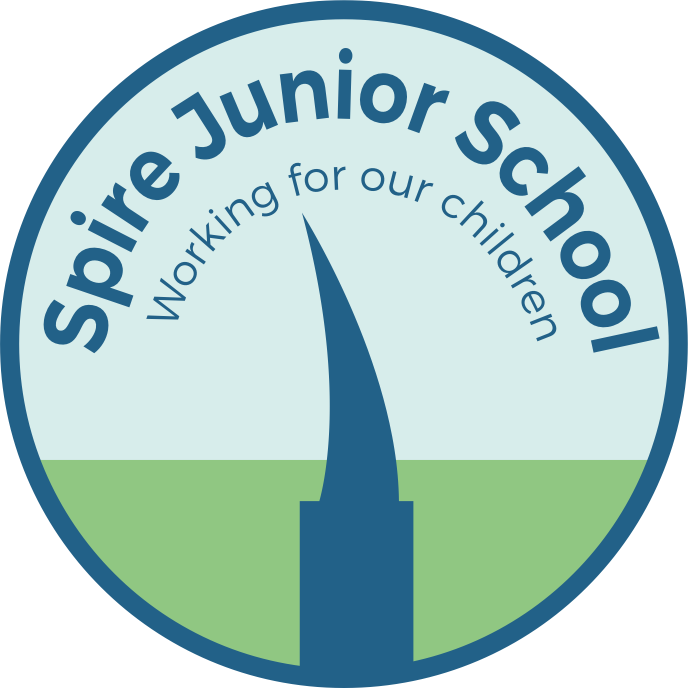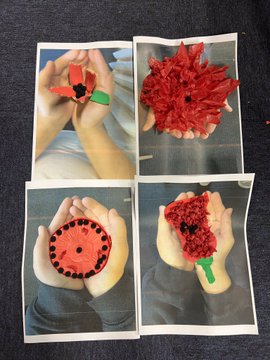Curriculum Overview
‘We’re here to put a dent in the universe' - Steve Jobs

Intent:
At Spire Juniors we believe that children should be supported, nurtured and encouraged to become global citizens, having the purpose, skills and dreams to make a better future. We believe that by creating an exciting and stimulating learning environment we can prepare our children to be safe, ready and respectful members of society with the best start in life.
The curriculum structure allows continued innovation and development. Teachers have the freedom and confidence to change, adapt and develop the content of individual projects which are underpinned by our non-negotiables skills and ‘procedural’ knowledge, namely:
Procedural skills and knowledge by subject.
| History | Geography | Arts |
|
Plan and research Analyse and evaluate Show empathy Show a commitment to justice Explore issues, events and problems from different perspectives Support conclusions using reasoned arguments and evidence Communicate their learning in relevant ways
|
Recognise that they can impact their environment and community Show a commitment to justice Recognise their roles as Global citizens Communicate learning in relevant ways Show empathy Understand that human and physical geography are interconnected
|
Show flexibility Organise time and resources Communicate their learning in relevant ways Work towards a goal Adapt ideas as circumstances change Reflect upon and evaluate their own work as well as the work of others Create and demonstrate using a variety of different media and materials
|
Implementation
Our curriculum is organised into three areas, ‘Discover’, ‘Explore’ and ‘Create’.
Working across three terms allows us to explore areas of the curriculum in greater depth. In the autumn term, the main driver is History; in the spring term, its Geography, and in the summer term, we focus on the Arts. This allows our children to fully 'get to grips' with the sticky knowledge, procedural skills and non-negotiables in each of the areas.
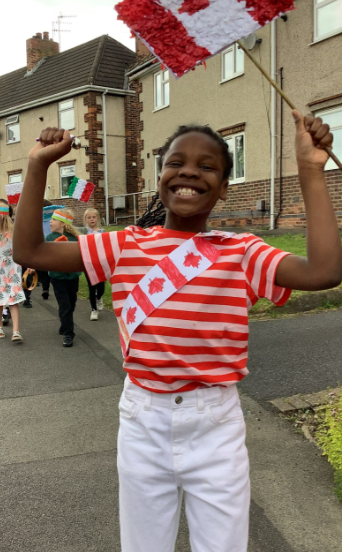
Each driver subject is led by a key question, which focusses the learning for the term. For example, in our Discover Term, Year 3/4 are exploring the question 'When do new inventions become artefacts?' as they explore the developments made from the Stone Age to the Iron Age.
Our three drivers then inform our wider curriculum, most notably in Reading and Writing, though where possible and purposeful links can be made, in Science, RE, PSHE and the wider curriculum as well.

Central to the curriculum are our 'Core Skills' that underpin everything we do:
Active Learning:
- To seek out and enjoy challenges
- To collaborate with others
- To show commitment and perseverance
- Assess themselves and others
Basic Skills:
- To speak clearly and convey ideas confidently
- To read and communicate ideas in writing efficiently and effectively.
- To calculate efficiently and apply skills to solve problems
- To use new technologies confidently and purposefully
Creative Thinking:
- To ask questions to extend their thinking
- To generate ideas and explore possibilities
- To overcome barriers by trying out alternatives or new solutions
- To connect ideas and experiences in inventive ways
We believe that our children deserve inspirational learning opportunities. Curriculum planning ensures that children are immersed in exciting projects with authentic outcomes. They are challenged to work creatively whilst deepening their knowledge and understanding through highly engaging and enriching experiences.
- Using a ‘long term’ concept-based learning model, we begin by identifying the curriculum content to be covered. We then identify key concepts that can be drawn out to allow different areas of the curriculum to be threaded together using a long term overview. The concepts are then framed with an enquiry question that provides a starting point for the projects. Throughout, children are encouraged to think deeply about their work, expand their horizons and take responsibility for their learning.
- In order to expand our children’s often limited horizons all our projects are contextualised, culturally relevant and purposeful. Children work towards authentic outcomes and engage with critical audiences, e.g. journalists and shop window dressing. Projects frequently involve the children dealing with complex issues, and, as a result, they develop an understanding of what is possible and a belief that they can make a difference.
- We have exceptionally high expectations of learning and outcomes. Our curriculum is designed to allow children to work on real world projects. Each project engages with external critique and ‘real world feedback’ to provide a reason for children to redrafting and adapting their learning. Ultimately we want our children to be instilled with the desire to produce unique work.
- Projects use a combination of direct teaching, facilitated learning and guided discovery within the classroom and the wider environment.A plethora of opportunities exists to allow our children work alongside experts and professionals, take part in visits and residential trips, contribute to inter-school events, visit local industries as part of our STEM residential trip to Whitehall’, sing with ‘Young Voices’, run with the Brownlee brothers and take part in the amazing Mini Police programme! Our classroom environments are designed to encourage children to work collaboratively, flexibly and with high levels of independence.
Assessment:
The three curriculum themes of history, geography, and arts have rigorous skills progression grids which ensure that key subject-specific learning is embedded throughout each project.
Throughout each term, children are continually formatively assessed through our recall and retention activities (our 6 in 6 quizzes, Plicker quizzes, true or false activities), and through the use of our verbal feedback policy. Formative judgements are made mid-term to allow teachers to adapt learning opportunities and then again at the end of the unit. This includes checking on the retention of sticky knowledge, key dates and key vocabulary. This informs the data shared with parents at Parents' Evenings and on reports.
Curriculum Development:
Continuous research and links with innovative schools are used to inform practice and high levels of reflectiveness throughout school lead to a shared commitment to continued development.
Please watch the video below for a brief overview of our curriculum
Please click here to see our curriculum overview
Please click here to see our curriculum policy
Our Latest End Projects
Our Year 4 children created a display of their Ancient Egyptian's work for the local Chesterfield Library. This showcased their non-chronological reports and newspapers they created in class as well as some artwork.

Our Year 3 children hosted their own 'WW2 Quiz Night' in th school hall and it was a huge success. Over 80 parents and members of the community attended. The children created different rounds showcasing their learning on areas such as 'The Blitz' and 'Rationing'. There were prizes for the winners donated from lots of local buisnesses.
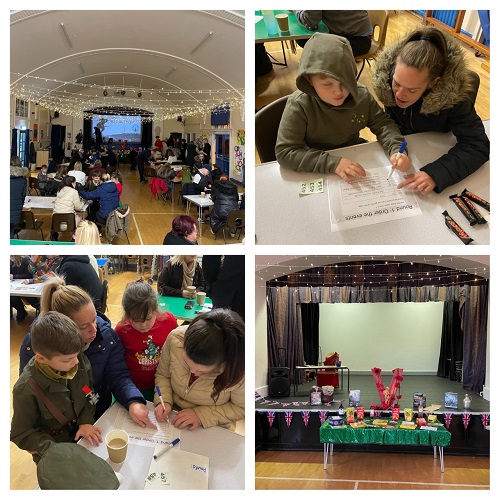
Our Year 5 classes put on a Victorian Christmas Market for family and members of the community where they sold items they had made including wreaths, knitted gonks, reindeer food and baubles. It was a great success raising over £170.
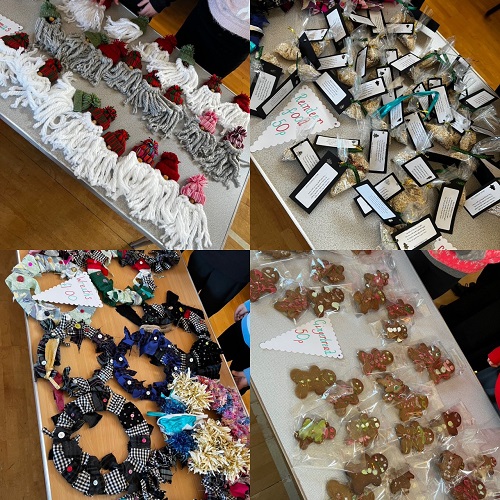
Our Year 4 children hired a market stall in Chesterfield town centre where they sold their African animals and raised £109 for WWF. They were also able to speak with members of the public about all their learning this term and share key facts and information.
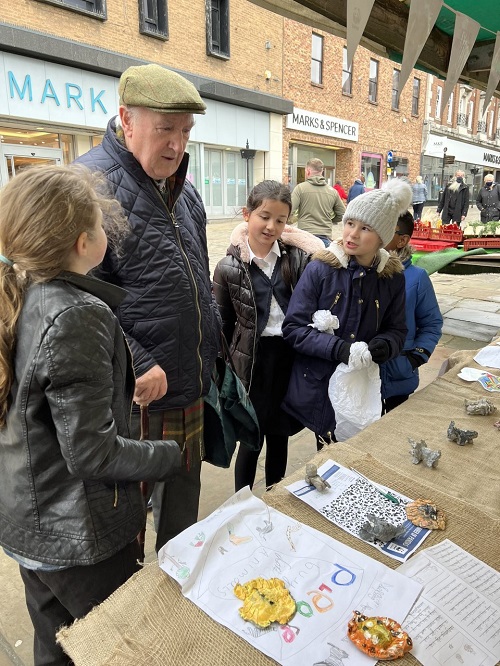
Our Year 5 children hired a shop window in Chesterfield town centre where they showcased all their learning about plastic pollution.
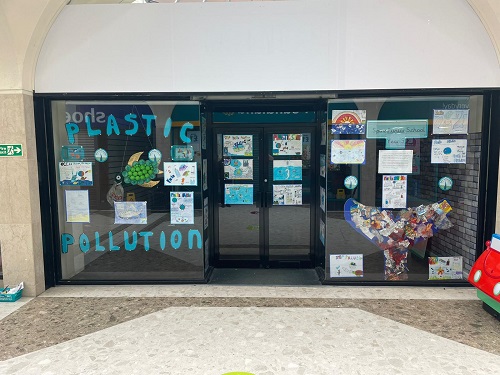
Our Year 6 children set up a QR Code trail near a local reservoir for members of the public to learn all about British Wildlife and woodlands.
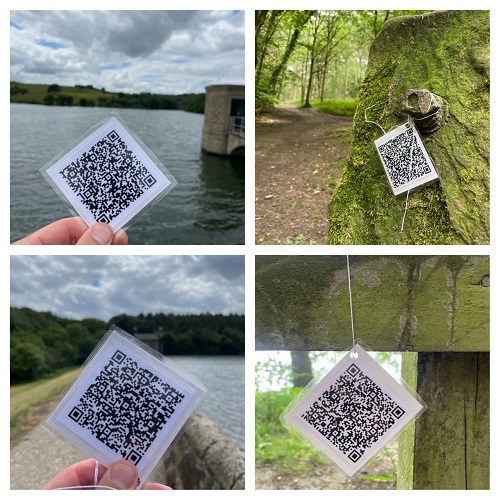
Our Year 6 children put on a spectacualr of 'Beauty and the Beast'.

Our Year 3 children redesigned and decoarted our school garden area for other year groups to use.

Our Themed Days
WW2 Day - The children in Year 3 enjoyed many activities including cracking the morse code, compelting an assault course and baking using rationed products. The costumes were also fantastic varying from refugees to soliders.
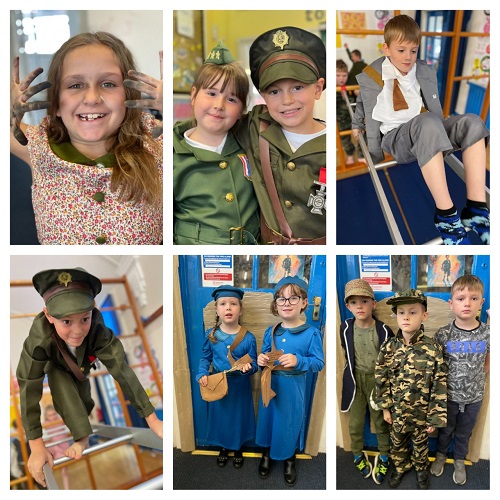
Ancient Egyptian Day - Our Year 4 chidlren had a fantastic day dressed as Mummies and Pharaohs for Ancient Egypt. They learnt how the process of mumification took place as they enetered the secret tomb as well as usign green screen technology to superimpose themselves onto different backgrounds.
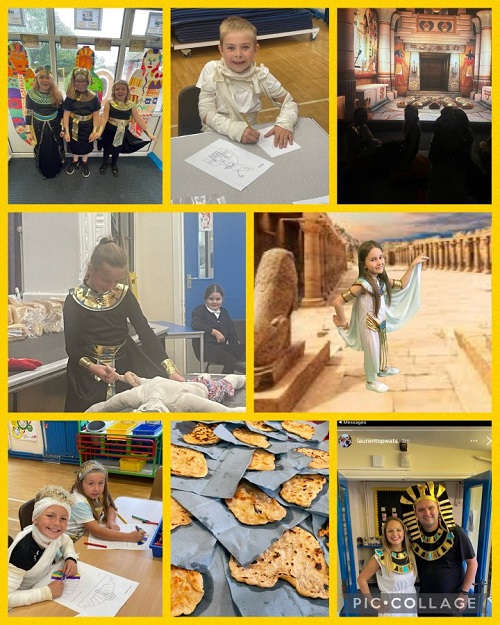
Victorian Day - Year 5 enjoyed a traditonal Victorian day featuring a dunce hat, seperate lessons for boys and girls as well as handwritign and arithmetic practise on blackboards. Thankfully, the cane wasn't used.
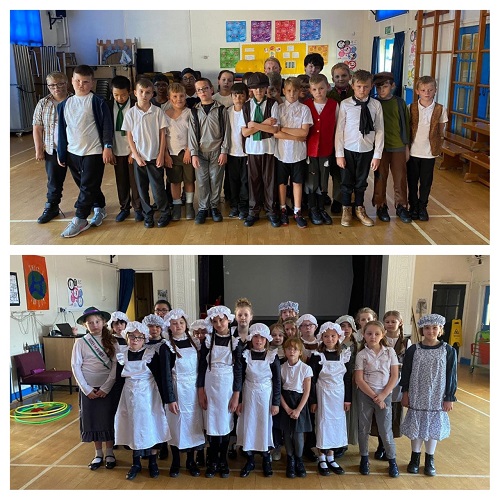
Religious Education
Children are taught R.E. on a termly basis. We follow the Derbyshire Agreed Syllabus.
P.E.
Children have at least two lessons of P.E. every week. They take part in a variety of sporting activities through our Real PE scheme, including gymnastics, dance, games, athletics and outdoor and adventurous activities. In Y5 the children learn to swim.
Computing
The children are taught about e-safety to help them to keep safe on the internet. They use the internet to research topics and find information. They are taught how to use databases, spreadsheets, multimedia and word processing programmes.
Children use ICT in all areas of the curriculum to support their learning.
Other Subjects
Our other subjects are taught to support our main project. Over each term, children will cover:
- Science
- Music
- Spanish
- Personal, Social, Health and Citizenship Education
- Art
If you require any further information about our school curriculum please email Mrs Charlotte Vernon at enquiries@spire-jun.derbyshire.sch.uk.
